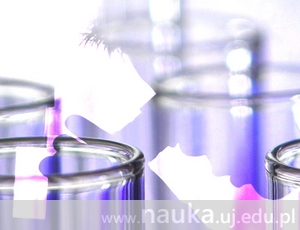
In an article published by Structure, a JU research team have revealed the structure of proteins responsible for cancer camouflage.
Prof. Tadeusz Holak (JU Faculty of Chemistry, Małopolska Centre of Biotechnology, and Max Planck Institute) and Dr Grzegorz Dubin (Faculty of Biochemistry, Biophysics and Biotechnology, and Małopolska Centre of Biotechnology), along with other scientists, have been conducting crystallographic research on the structure of the protein complex responsible for making cancer cells invisible to the immune system. The results of their research have been published in the October issue of Structure.
The researchers have studied a particular type of protein, called PD-1 (programmed cell death protein 1), and one other protein which is closely related to the first one – PD-L1. Thanks to those proteins, the organism is able to discern which cells should be destroyed. Cancer cells produce an unusually high amount of those two proteins, making them invisible to the immune system. However, it is possible to block this mechanism, which causes our body to respond accordingly.
This breakthrough will provide us with an opportunity to design better medicine. Knowing the structure of the protein, the scientists will be able to search for a specific part which should be treated. Of course, there is still a long road ahead of us, but we have come one step closer, thanks to the efforts of the JU researchers.
Dr Grzegorz Dubin on his research
According to Dr Grzegorz Dubin, it has been a known fact that cancer cells camouflage by producing the PD-L1 particle in order to hide from the immune system. However, the recently discovered fact this camouflage can be disabled by blocking the particle means that our organism will be able to combat it in the way it normally should. Currently, effective medicine based on monoclonal antibodies (proteins with an ability to recognise specified particles) are being introduced into the market.
The next step will be designing small-particle compounds with similar properties. By discovering the structure of the PD-1/PD-L1 complex, the JU researchers have paved the way to designing such compounds. A deeper understanding and knowledge about the structure of the proteins will enable scientists to predict what types of small particles will affect them.
Although the antibodies which are available now are effective in treating cancer, they have several disadvantages, such as the method off application (intravenous injection) and cost. In the future, a small-particle compound could eliminate these drawbacks.
Original text: www.nauka.uj.edu.pl





